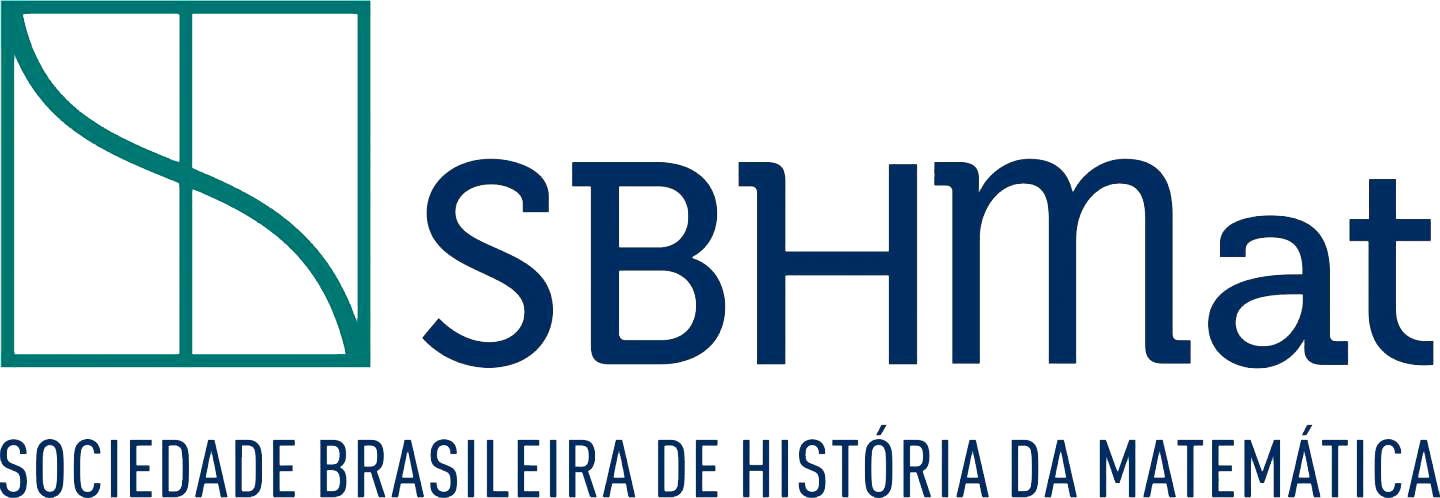From Practical to Pure Geometry and Back
DOI:
10.47976/RBHM2020v20n3913-33Palavras-chave:
Mathematics, History, Geometry, Euclid, Elements, Data, Optics, MenoResumo
The purpose of this work is to address the relation existing between ancient Greek (planar) practical geometry and ancient Greek (planar) pure geometry. In the first part of the work, we will consider practical and pure geometry and how pure geometry can be seen, in some respects, as arising from an idealization of practical geometry. From an analysis of relevant extant texts, we will make explicit the idealizations at play in pure geometry in relation to practical geometry, some of which are basically explicit in definitions, like that of segments (straight lines) in Euclid‘s Elements. Then, we will address how in pure geometry we, so to
speak, ―refer back‖ to practical geometry. This occurs in two ways. One, in the propositions of pure geometry (due to the accompanying figures). The other, when applying pure geometry. In this case, geometrical objects can represent practical figures like, e.g., a practical segment.
Downloads
Métricas
Referências
ASPER, M. 2003. The two cultures of mathematics in ancient Greece. In: Robson, E., & Stedall, J. (Eds.), The Oxford handbook of the history of mathematics. Oxford: Oxford University Press, pp. 107-132.
BÄCK, A. 2014. Aristotle’s theory of abstraction. Heidelberg: Springer.
BARCELÓ, A. A. 2018. Mathematical pictures (draft version). Retrieved from <http://www.academia.edu/194 6205/Mathematical_Pictures> in May 2019.
BLUMSON, B. 2014. Resemblance and representation. An essay in the philosophy of pictures. Cambridge: Open Book Publishers. BURTON, H. E. 1945. The Optics of Euclid. In: Journal of the Optical Society of America, vol 35, pp. 357-372.
CUOMO, S. 2001. Ancient mathematics. London: Routledge
EARMAN, J. 1989. World enough and space-time: absolute versus relational theories of space and time. Cambridge: Mit Press.
EUCLID 1956. The thirteen Books of the Elements (second edition, Vols. I-III). Translated with introduction and commentary by Sir Thomas L. Heath, from the critical edition of Heiberg. New York: Dover Publications.
HARARI, O. 2003. The concept of existence and the role of constructions in Euclid‘s Elements. In: Archive for History of Exact Sciences, vol 57, pp. 1-23.
HEATH, T. 1949. Mathematics in Aristotle. Oxford: Clarendon Press.
HØYRUP, J. 2002. Lengths, widths, surfaces: a portrait of Old Babylonian algebra and its kin. New York: Springer.
JAMME, M. 1993. Concepts of space. The history of theories of space in physics. Third, enlarged edition. New York: Dover Publications.
KNORR, W.R. 1986. The ancient tradition of geometric problems. Boston: Birkhäuser.
KULVICKI, J.V. 2014. Images. London: Routledge.
LEWIS, M.J.T. 2001. Surveying instruments of Greece and Rome. Cambridge: Cambridge University Press.
MUELLER, I. 1981. Philosophy of mathematics and deductive structure in Euclid’s Elements. Cambridge: MIT Press.
NETZ, R. 1999. The shaping of deduction in Greek mathematics: a study in cognitive history. Cambridge: Cambridge University Press.
NETZ, R. 2004. Eudemus of Rhodes, Hippocrates of Chios and the earliest form of a Greek mathematical text. In: Centaurus, vol 46, pp. 243-286.
PLATO. 1997. Complete works. Edited with introduction and notes by J. M. Cooper. Indianapolis: Hackett Publishing Company.
TAISBAK, C. M. 2003. DEDOMENA. Euclid’s Data or the importance of being given. Copenhagen: Museum Tusculanum Press
Downloads
Publicado
Métricas
Visualizações do artigo: 477 PDF downloads: 361




































